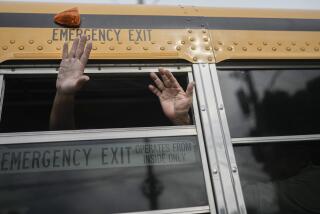Ortega Orders Suspension of Trials of Security Cases by People’s Courts
- Share via
MANAGUA, Nicaragua — President Daniel Ortega decreed on Monday a suspension of all trials of national security cases by revolutionary people’s tribunals.
Ortega told an evening press conference that all cases awaiting judgment by the Popular Anti-Somocista Tribunals will be transferred to the regular judicial system.
The people’s courts, set up by decree in 1983, are called anti-Somocista because Nicaragua’s Sandinista rulers like to brand all enemies as backers of the late dictator Anastasio Somoza, whom they overthrew in 1979.
No Appeals
The tribunals have been criticized by international human rights organizations because their members are Sandinista party activists, their standards of evidence for prosecution are less rigorous than in regular courts and their verdicts cannot be appealed. They have a conviction rate of 89%, government figures show.
Civil rights lawyers here said that about 1,000 prisoners, most of them accused of joining or aiding the U.S.-backed guerrilla movement, are awaiting judgment by the people’s courts on charges of violating Nicaragua’s Law for the Maintenance of Public Order and Security.
Among them is James Jordan Denby, an American farmer whose private plane was shot down over Nicaragua last Dec. 6 and who was accused of working for the Contras.
Another American shot down by the Sandinistas, Eugene Hasenfus, was convicted by a people’s court in November, 1986, for smuggling weapons to the Contras. He was pardoned and freed the following month.
Ortega told the press conference that he had signed separate decrees suspending the people’s tribunals and Nicaragua’s six-year-old wartime state of emergency to comply with a Central American peace accord.
He had announced the lifting of emergency rule at the end of a Central American summit meeting Saturday. But he would not comment at the time on the fate of the people’s courts.
Neither decree was made public, and it was unclear whether the security law, which carries prison sentences of up to 30 years, had been modified.
Enrique Sotelo Borgen, an opposition assemblyman and lawyer, welcomed the decrees but said “the more important issue” is amnesty for several thousand convicted prisoners.
Exile Offer
Ortega said he is willing to free 1,500 Contra convicts and 1,800 former members of Somoza’s National Guard only if the government successfully negotiates a cease-fire with the U.S.-backed rebels or if countries outside Central America agree to accept them as exiles.
Cardinal Miguel Obando y Bravo, the mediator in the cease-fire talks, said after meeting with Ortega on Monday that he would contact President Reagan, through Roman Catholic leaders in the United States, to ask him to accept the prisoners.
More to Read
Sign up for Essential California
The most important California stories and recommendations in your inbox every morning.
You may occasionally receive promotional content from the Los Angeles Times.













